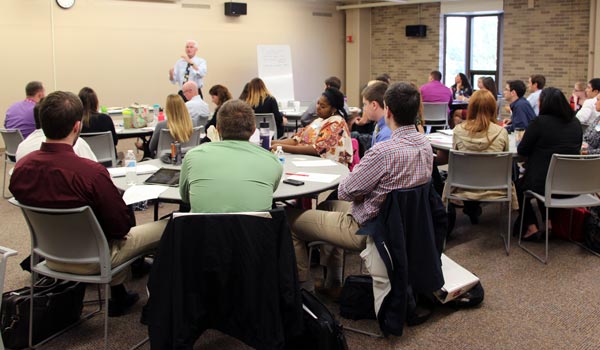The Department of Educational Foundations & Policy Studies provides both undergraduate and graduate degree programs, as well as teaching certification programs. More specifically, the Department offers coursework in such areas as educational foundations, educational research, educational psychology, assessment and measurement, instructional technology, and environmental education. Other areas include secondary field experience, methods, and student teaching. Courses are offered every semester at the undergraduate and graduate levels.
Philosophy Statement
We Believe...
- Learning and teaching are active, collaborative, constructive, and continuous processes that enable faculty and students to reflect upon and analyze their own learning and teaching.
- Direct Experience in learning situations is essential.
- Learners should engage in developmentally appropriate activities that are meaningful and authentic.
- High standards of scholarship are essential for both faculty and students to remain at the forefront of sound educational practice and change.
Purpose
The purpose of the program is to prepare teachers who will apply knowledge of the learner, content, pedagogy, and self to make appropriate decisions regarding students, curriculum, and instructional strategies. The program will encourage the development of practitioners who engage in continual reflection and analysis leading to life-long, professional growth and commitment to active participation in their schools and communities.
Mission Statement
The ability to function effectively as an educator of young people, while navigating this rapidly-changing world, requires that educators cease to be cast as passive objects within their schools and communities and instead become engaged and active leaders. The increasingly oligarchic nature of our society, which is manifested in both public and private power structures, has had a profound effect upon our educational systems. We have witnessed a steady rise in repressive control, which comes increasingly from outside local communities and schools. Therefore, now more than ever, educators need to be able to work for change, not only within their classrooms and schools, but also in their communities and in society at large if democracy is to be a defining and organizing force within our institutions. To make such a transition, educators need to examine and comprehend the political, social, and historical structures that shape educational policy and, by extension, the context of their work. The Department of Educational Foundations and Policy Studies is dedicated to fostering the development of educators with the requisite critical consciousness and pedagogical skills to act as public intellectuals; citizen-teachers capable of creating pedagogical spaces and practices that are relevant, impactful, and liberating for their students.


